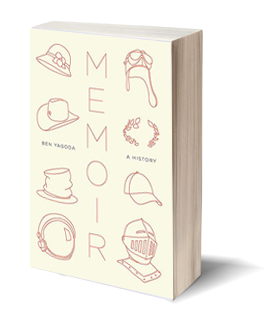Memoir: A HistoryBy Ben Yagoda |
 |
|---|
Reviewed by Max Ross
“Reality is the fastest American commodity,” writes Aleksandar Hemon in his 2008 novel, The Lazarus Project. “The incessant perpetuation of collective fantasies makes people crave the truth and nothing but the truth.”
And he’s right, I think. Maybe it’s because there’s not a lot to believe in anymore–our meat is tainted, definitely; our world is warming, definitely–and so we need something on which to pin our faith. But because of the difficulty in discerning capital-T Truths in the world, we settle mostly for facts, the best of which seem immutable and undeniable in the way God used to be.
The Lazarus Project imparts this information with a wink: the book is fiction, and as such the odds of success were stacked against it, at least from a marketing perspective. In the last half-century, the American craving for truth and fact has made the Novel a bench player in entertainment media while simultaneously making memoirs the fastest growing literary commodities in the country.
Memoir: A History, Ben Yagoda’s study of the genre, documents how–and a little bit of why–memoir has become the predominant form. Claiming the fifth-century The Confessions of St. Augustine as the first modern-ish example of the genre, Yagoda traces the history of the memoir–and along with it, the history of its fallibility–up to the present day.
The book begins with a Genesis-like roll call of sub-genres: dog memoirs, dad memoirs, misery memoirs, holocaust memoirs (a specialized subset of misery, to be sure), celebrity memoirs, spiritual memoirs, and so on. By and large, the ten chapters that follow are just extrapolations of what we’re introduced to here, with Yagoda approaching his subject with something like lust, his enthusiasm showing throughout the crisp, wry prose.
There’s no denying that the book achieves exactly what it sets out to do, following the evolution of the genre and marking the traits it develops for survival. But there’s a repetition in the rising and falling of the autobiographical sub-species that’s inherently dull, and—if Yagoda is to be faithful to history—then perhaps this dullness is unavoidable. While there are exciting, revealing tidbits–“The development of glass mirrors at the end of the fifteenth and beginning of the sixteenth centuries has been cited as a key factor in the Renaissance emphasis on the self”–most of the intrigue in these sections comes from excerpted portions of the memoirs in question.
Memoir really gets cooking, though, when Yagoda addresses the topic of Truth. Anyone who pays any attention to the book world or to Oprah likely knows the story of James Frey’s semi-fabricated memoir, A Million Little Pieces, and how it threatened to taint the entire industry. It follows that anyone who picks up Memoir will likely expect a bit of discussion of Frey’s transgression and what it means to autobiographical writing. Instead, we learn of memoirs dating back to the early 1800s whose factual bases were questioned (with the aside that Daniel Defoe’s 1718 Robinson Crusoe suffered “the first recorded instance of an attack on a fake memoir”). Turns out that authenticity of personal narratives has been heatedly and steadily debated for centuries, that authenticity is near-impossible to achieve in the first place, and also that our expectations to read truth are actually kind of ludicrous. Citing studies on the imperfection of memory by psychologists C.R. Barclay, Ulric Neisser, and Sigmund Freud, we’re told (and convinced) that “memory is by nature untrustworthy…It is itself a creative writer.”
Yagoda picks up the argument again in Memoir’s final chapter, “Truth and Consequences.” The real question soon becomes not whether every line of dialogue in a memoir is faithful to words actually spoken in its author’s life, but whether the writer is willfully and knowingly deceiving readers, and to what purpose. Here we get a roll call of award-winning, best-selling, fraudulent memoirs. There are a lot of them. And one finds that, true or not, these are undeniably stories with a lot of power in them. Yet we’re willing to submit to that power only if we believe in a memoir’s factualness. Do we, as readers, have a right to expect the factual truth? Would we be better off if we were able to sever a book from its author, and allow that stories might not be true, but still hold Truth? Probably, but that’s not likely ever to happen. In the end, Memoir leaves us with a somewhat sad, but fundamental, reality: We might like the truth, but really we have no idea what it is.
